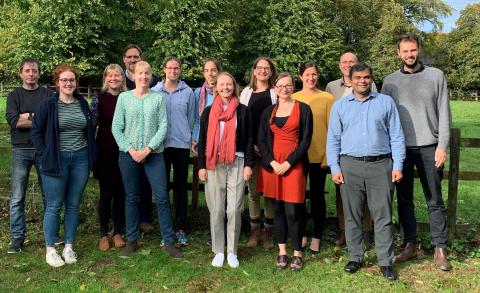As international experts in crop physiology, crop improvement and crop management, our research goals are to understand:
- the physiological processes by which crops capture resources (light, CO2, water, nutrients)
- how crops use these resources to produce saleable products (crop yield & quality).
- how environmental factors (e.g. climate, weather and soil), plant breeding and crop management factors (e.g. species and variety choice, establishment, nutrition, crop protection products, biostimulants) affect crop performance.
- how cropping systems and management affect the environment (e.g. through nitrate leaching, greenhouse gas (GHG) emissions).
We distil the scientific evidence we collect into sound practical guidelines for growers.
Our areas of expertise include:
- Understanding yield formation of arable and forage crops
- Optimising nutrition for arable and forage crops
- Evaluation of fertiliser, biostimulant and PGR products
- Lodging control
- Precision Farming: understanding how precision farming technologies can optimise inputs
- Root growth: measurement and methods of enhancement
- Operating farmer networks: Yield Enhancement Networks (YEN) for cereals, oilseeds, pulses and carbon; NUTRI-CHECK NET – a Europe-wide network aiming to optimise crop nutrition decision making.
- Designing better farming systems
- Sound scientific experiments/analysis/reviews that are publishable in international peer reviewed journals
- Distil science into practical guidance for the farm industry and academia, and transfer this effectively to end users
- Testing ideas on-farm through small plot trials, tramline trials and more
For more information about ADAS and what it does go to https://adas.co.uk/
Crop experiments
Our applied research is scientifically rigorous, hypothesis-driven, and challenge-led. We carry out experiments at a range of scales including:
- Small plot field experiments: ADAS conducts field trials with over 15,000 plots per year testing effects of all aspects of arable and forage crop management
- Controlled Environment experiments including glasshouse, polytunnel and seedling rooting screens to evaluate effects of varieties and seed treatments on rooting
- Tramline trials and split-field trials using our Agronomics technology.
- Download our guide to farmer led crop trials
- Analysis and reporting of raw yield map data from earlier client-run split-field or tramline trials, to determine statistical confidence in treatment differences.
We also carry out desk studies, such as literature reviews, feasibility reports and scoping studies on a variety of topics for a range of clients, including Defra and agrochemical companies.
Cutting edge crop research
Agronomics
One of our key research advances is our Agronomics service. This new technology enables farmers to compare agronomic treatments at tramline, split-field and whole field scales. Using Agronomics precision technology can allow us to detect significant differences of <0.1 t/ha.
View the flyer detailing the services HERE.
Yield Enhancement Networks (YEN): www.yen.adas.co.uk
The YEN was initiated back in 2012, with the aim to foster and energise a new culture of yield-enhancing innovation in the arable industry. Originally focusing on wheat, the collaborative, industry-wide network has expanded to include all cereals, oilseed rape, peas, beans and linseed. New YEN networks have also been developed focusing on crop nutrition (YEN Nutrition) and carbon emissions (YEN Zero). The family of YEN networks have accumulated more than 5000 yields, along with over 1 million explanatory metrics. This puts the YEN in a unique position to analyse the complexities of how to make progress toward the urgent twin challenges of raising farm productivity and ensuring its sustainability.
Examples of our work
- Evidence and expertise to update industry fertiliser guidelines (AHDB Nutrient Management Guide - RB209) through our FACTs qualified team
- Field trials to evaluate crop varieties for AHDB Recommended Lists
- Evidence to enable Defra to develop policy on regulation of fertilisers and biostimulants
- Wheat Growth Guide
- New pest threshold guides for pollen beetle and wheat bulb fly
- Guidelines to reduce the risk of lodging
- Root-2-Res: A Horizon Europe project to enable new varieties with better root systems to be bred.
- NUTRI-CHECK NET: a Europe-wide network aiming to optimise crop nutrition decision making..
Links to all key documents mentioned below:











Discussion